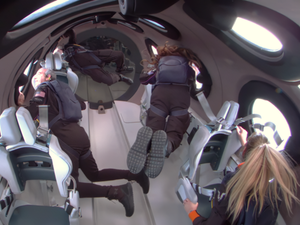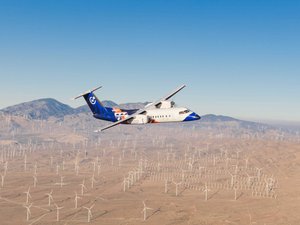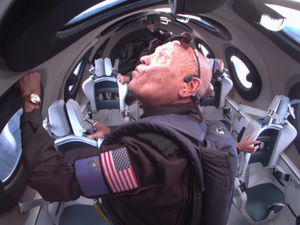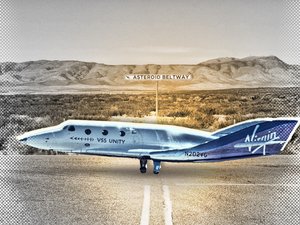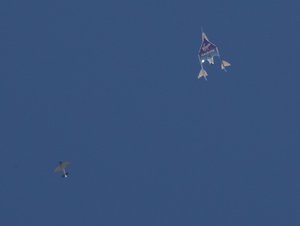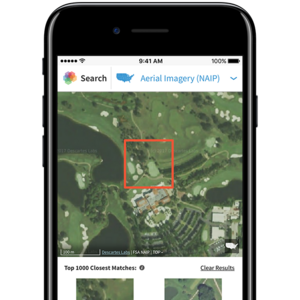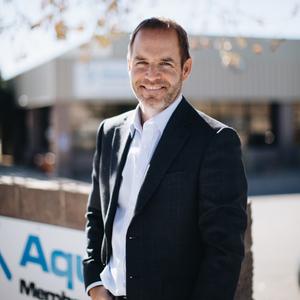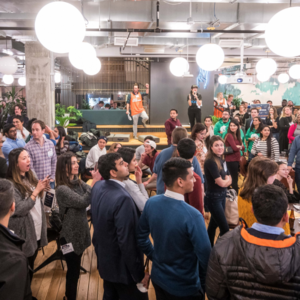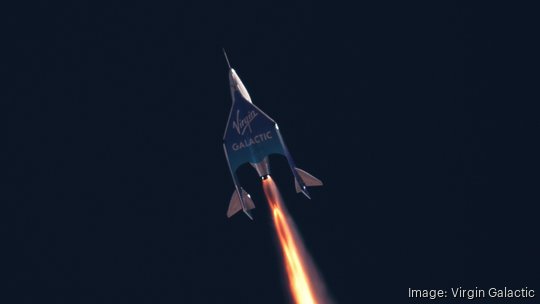
When Virgin Galactic next flies into low Earth orbit from New Mexico's Spaceport America — currently scheduled for Thursday, Nov. 2 — a pair of experienced researchers will be on board the space tourism company's ship, VSS Unity.
Those researchers are Alan Stern, Ph.D., and Kelli Gerardi, who will conduct five experiments in zero-gravity conditions. It'll be the sixth time Virgin Galactic has flown microgravity and space-based research, and the second time this year.
More specifically, Stern's zero-gravity research is a privately funded training flight for a future suborbital spaceflight through NASA's Flight Opportunities program, according to Virgin Galactic. It's sponsored by the Southwest Research Institute, an advanced science and applied technology nonprofit based in San Antonio where Stern works as a vice president.
NASA's Flight Opportunities program gives scientists the opportunity to demonstrate technologies for space applications. In particular, Stern's experiments on board VSS Unity to train for the NASA program include evaluating a biomedical harness device and training to use a camera technology called "Xybion," according to information shared by Virgin Galactic.
Gerardi's research mission, in contrast, is sponsored by the International Institute for Astronautical Sciences (IIAS). That research has been developed through the National Research Council of Canada, a government agency to support technological innovation in the northern North American country.
Her experiments, similar to some of Stern's, involve a biomonitoring technology called "Astroskin," configuration of fluid in low-gravity environments and continuous blood glucose monitoring in sub-orbit.
Research missions, like next week's planned "Galactic 05" flight with Stern and Gerardi on board, are a core part of Virgin Galactic's business model as a commercial company, according to CEO Michael Colglazier. Virgin's first commercial mission, back in late June, was a research flight with a crew of two Italian Air Force officers and an Italian researcher.
Colgalzier said during Virgin Galactic's second-quarter earnings call on Aug. 1 the company's research capabilities offer a few advantages, including a modular spaceship cabin to be adjusted for specific needs, different experiment structures and the ability to load payloads immediately prior to flight and access data right after landing.
Conducting research on board VSS Unity can also be less costly than accessing the International Space Station, for instance, according to Colglazier. There's a "sweet spot" for suborbital research that the company is attempting to take advantage of, he said.
"As we now begin to build out this product vertical, we believe the combination of extended time in microgravity, capability for researchers to accompany their experiments in space, and relatively favorable cost positioning, will enable the attraction of both new and repeat research customers," the CEO said during the earnings call.
A recent blog post by Stern, one of the researchers who is planning to fly with Virgin Galactic next week, expresses the same sentiment.
"It is unusual, maybe even unique, to fly a space mission purely as a training exercise," Stern wrote in the post. "But that's a testament to the increasing normalization of spaceflight."
Doug Ahrens, Virgin Galactic's chief financial officer, indicated during the Q2 earnings call that research missions can bring in more revenue for the company. He estimated that, if Virgin conducted a research mission during Q4 of this year, the company could see its revenue in that quarter pushed above $2 million.
"Going forward, for Q3 and Q4, when we look at the manifest details, it depends if its going to be astronauts or research flights," Ahrens said on the call. "Depending on what we do with that mix and the manifest in particularly the fourth quarter, we could see higher revenue."
Specifically, Colglazier said research flights will bring in about $600,000 per seat equivalent for Virgin. Around 10% of the volume of the company's first 1,000 flights, or about 100, are planned to be research missions, he added.
"What we're doing now is taking the success of this first flight, putting that into a kit that all those researchers and government agencies can use in their own appropriations discussions," Colglazier said on the call in reference to the June research flight. "[The] U.S. government and other governments across the globe."
Virgin Galactic will prioritize private astronaut flights, Colglazier added. But, he said on the call, research "appropriately adds a positive halo over the top of commercial spaceflight."
A third crew member will also be on board VSS Unity during the planned Nov. 2 mission alongside Stern and Gerardi. However, Virgin Galactic hasn't shared details on that crew member, dubbed "Astronaut 022," only referring to them as "private astronaut – Franco-Italian nationality."
That mirrors the privacy standards Colglazier explained on the same earnings call, and a focus on "customer experience."
"There will be some flights that we will want to do in a full public manner," he said. "As you'd expect, a lot — maybe not all — but a lot of our future astronauts are quite excited to tell their own story but don't necessarily want us to broadcast their personal experience. And so, we'll find a balance."
While general private astronaut ticket sales are on pause, with seats only available through luxury and experiential travel company Virtuoso, research sales remain ongoing, Colglazier said.
Its next flight after the planned November research mission is currently set for January 2024, which will allow time for "routine, planned annual vehicle inspections," according to Virgin Galactic. Virgin's other flights in 2023 up to this point, besides the June research mission, include three private astronaut flights — one in August, one in September and one in October.
